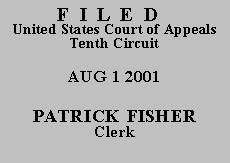

| JAMES JOSEPH OWENS-EL, | No. 01-1166
(D.C. No. 01-Z-239) (Colorado) |
A magistrate judge reviewed Mr. Owens' pleading and found it to be vague and conclusory. Accordingly, the judge ordered Mr. Owens to filed an amended application identifying any specific decision by the Board he is challenging and demonstrating that he has exhausted his administrative remedies. Mr. Owens filed an amended application. The district court reviewed this pleading, determined that Mr. Owens had failed to correct the deficiencies, and dismissed the action. Mr. Owens appeals, again asserting that the Board is improperly withholding parole on the basis of a crime he alleges he did not commit.
The material Mr. Owens has attached to his section 2241 application reveals that he did present to the Commission his claim that his parole guideline calculation was incorrect because it considered a crime he did not commit, that the Commission rejected his claim, and is in fact using this conviction in setting his parole guideline range. Accordingly, we conclude that Mr. Owens has set out his claim against the Commission with sufficient particularity, and that he has shown exhaustion of his administrative remedies. We nonetheless hold that his section 2241 application must be dismissed for the following reasons.
Other than bare conclusory allegations, Mr. Owens has presented nothing to support his claim that the Commission acted improperly in considering his 1984 conviction. To the contrary, the attachments provided by Mr. Owens himself demonstrate that the Commission established he was in fact convicted of the attempted murder in 1984 and given a new and consecutive twenty-year sentence for that crime.(1) Thus Mr. Owens has failed to state a claim against the Commission based on its alleged use of incorrect information.
Although couched as a challenge to the calculation of his parole guidelines, in essence Mr. Owens is asserting that he is innocent of a crime that the Commission used is making that calculation. The proper avenue of relief on this claim is to file a motion under 28 U.S.C. § 2255 in the court that imposed sentence on the challenged conviction. The purposes of petitions under section 2241 and section 2255 are distinct and well established. "A petition under 28 U.S.C. § 2241 attacks the execution of a sentence rather than its validity and must be filed in the district where the prisoner is confined." Bradshaw v. Story, 86 F.3d 164, 166 (10th Cir. 1996). In contrast, "[a] 28 U.S.C. § 2255 petition attacks the legality of detention . . . and must be filed in the district that imposed the sentence." Id. (citation omitted). Unless determined to be inadequate or ineffective, a section 2255 petition is the exclusive means for challenging the validity of a conviction. See Johnson v. Taylor, 347 F.2d 365, 366 (10th Cir. 1965). Here Mr. Owens is challenging the validity of his 1984 conviction and sentence for attempted murder, albeit by claiming that the alleged invalid conviction was improperly used in calculating his parole eligibility. Accordingly he must pursue that claim in the sentencing court under section 2255.
The judgment of dismissal is AFFIRMED.(2)
ENTERED FOR THE COURT
Stephanie K. Seymour
Circuit Judge
*.After examining appellant's brief and the appellate record, this panel has determined unanimously that oral argument would not materially assist the determination of this appeal. See Fed. R. App. P. 34(a)(2) and 10th Cir. R. 34.1(G). The case is therefore submitted without oral argument. This order and judgment is not binding precedent, except under the doctrines of law of the case, res judicata, or collateral estoppel. The court generally disfavors the citation of orders and judgments; nevertheless, an order and judgment may be cited under the terms and conditions of 10th Cir. R. 36.3.
1. We note that Mr. Owens' conviction for this assault was affirmed in a published opinion. See United States v. Owens-El, 889 F.2d 913 (9th Cir. 1989) (per curiam).
2. Mr. Owens has moved to proceed in forma pauperis on appeal. We have reviewed the material filed by Mr. Owens in support of his motion and conclude that he has failed to make a reasoned, nonfrivolous argument on the law and facts. See McIntosh v. United States Parole Commission, 115 F.3d 809, 812-13 (10th Cir. 1997). Accordingly, his request to proceed in forma pauperis is denied.